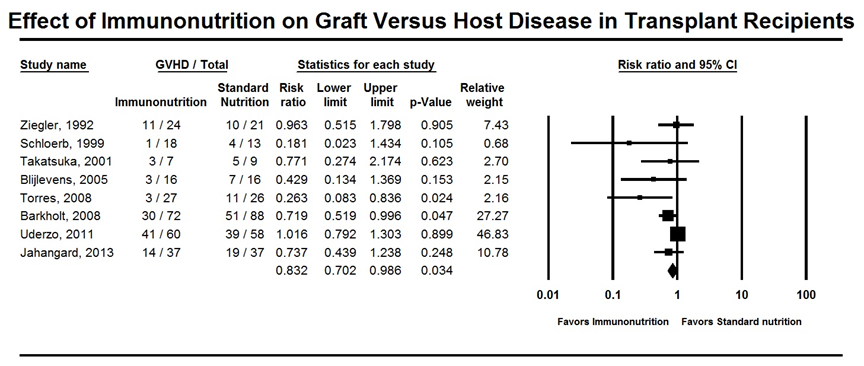H. Kota3, R. S. Chamberlain1,2,3 1Saint Barnabas Medical Center,Surgery,Livingston, NJ, USA 2New Jersey Medical School,Surgery,Newark, NJ, USA 3St. George’s University School Of Medicine,St. George’s, St. George’s, Grenada
Introduction: Graft versus host disease (GVHD) is a serious complication of bone marrow transplantation requiring higher doses of glucocorticoids or immunosuppressive therapies, further straining transplant recipients. Immunonutrition, such as vitamins and amino acids, act to increase immunity, decrease inflammation, and decrease oxidative stress. This meta-analysis examines the impact of immunonutrition on the incidence of GVHD and post-operative infections among transplant recipients.
Methods: A comprehensive literature search for all published randomized control trials (RCTs) was conducted using Pubmed, Cochrane Central Registry of Controlled Trials, and Google Scholar (1966-2015). Keywords in the search included all terms related to immunonutrition, such as ‘vitamin C’ or ‘ascorbic acid’ and ‘transplant.’ Outcomes analyzed included incidence of GVHD and infection.
Results: 8 RCTs involving 529 transplant recipients (261 receiving immunonutrition and 268 receiving standard nutrition) were analyzed. Immunonutrition reduced the incidence of GVHD by 17%; (RR = 0.832; 95% CI, 0.702-0.986; p=0.034). There was no significant difference in the incidence of infections with the use of immunonutrition (RR = 1.016, 95% CI, 0.819-1.261, p=0.885). Subgroup analysis by the type of immunonutrition, showed no difference in the incidence of GVHD or infections.
Conclusion: Immunonutrition reduces the risk of GVHD in transplant recipients possibly due to better nitrogen balance, immune support and free radical scavenging. Additional studies specifically evaluating the use of immunonutrition on infection incidence in bone marrow transplant recipients are required.
